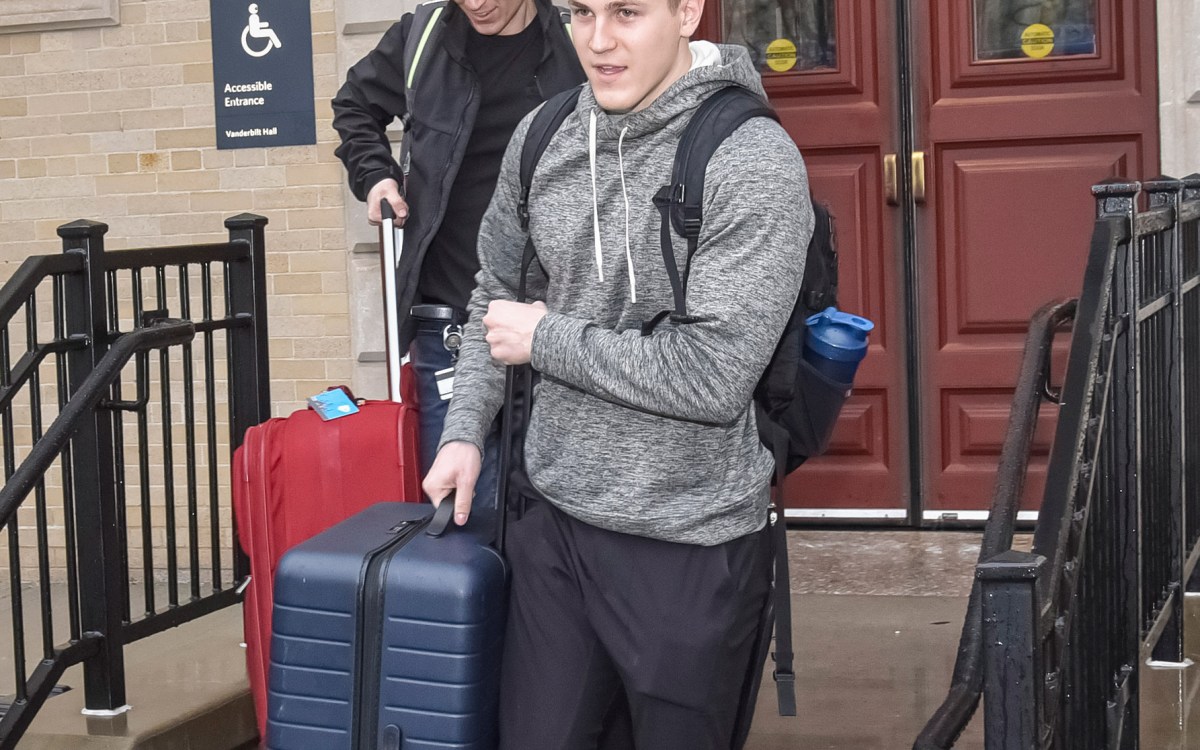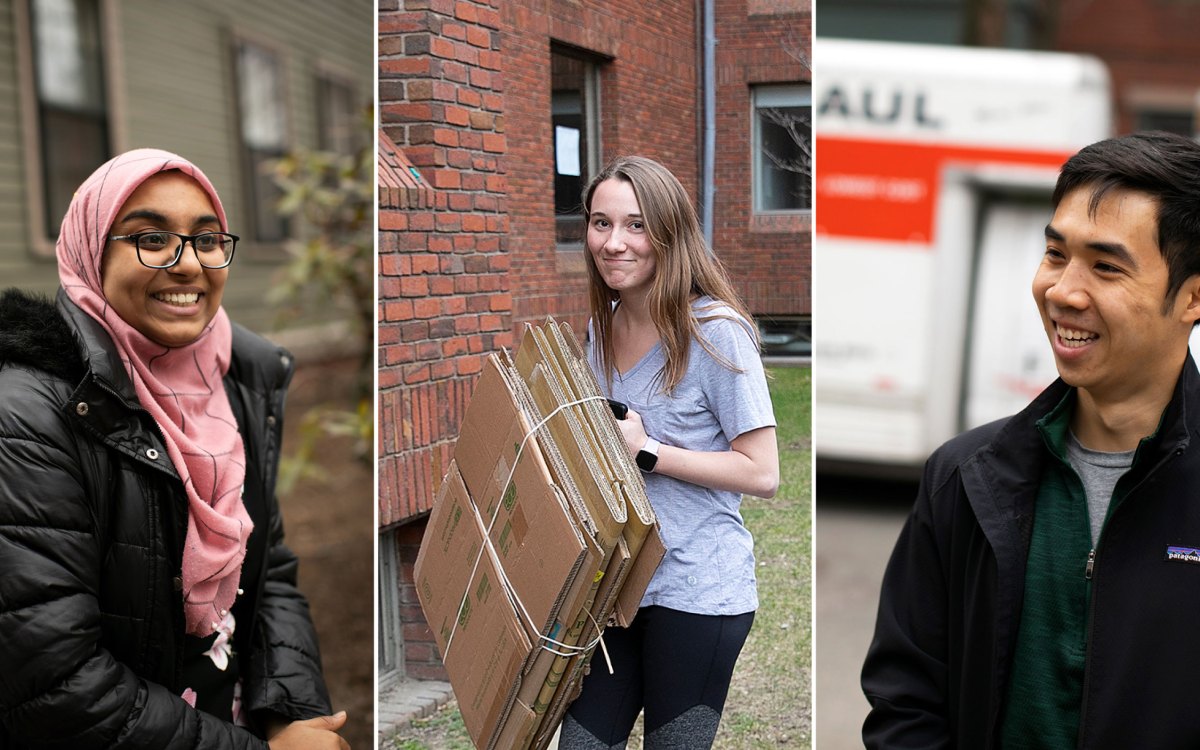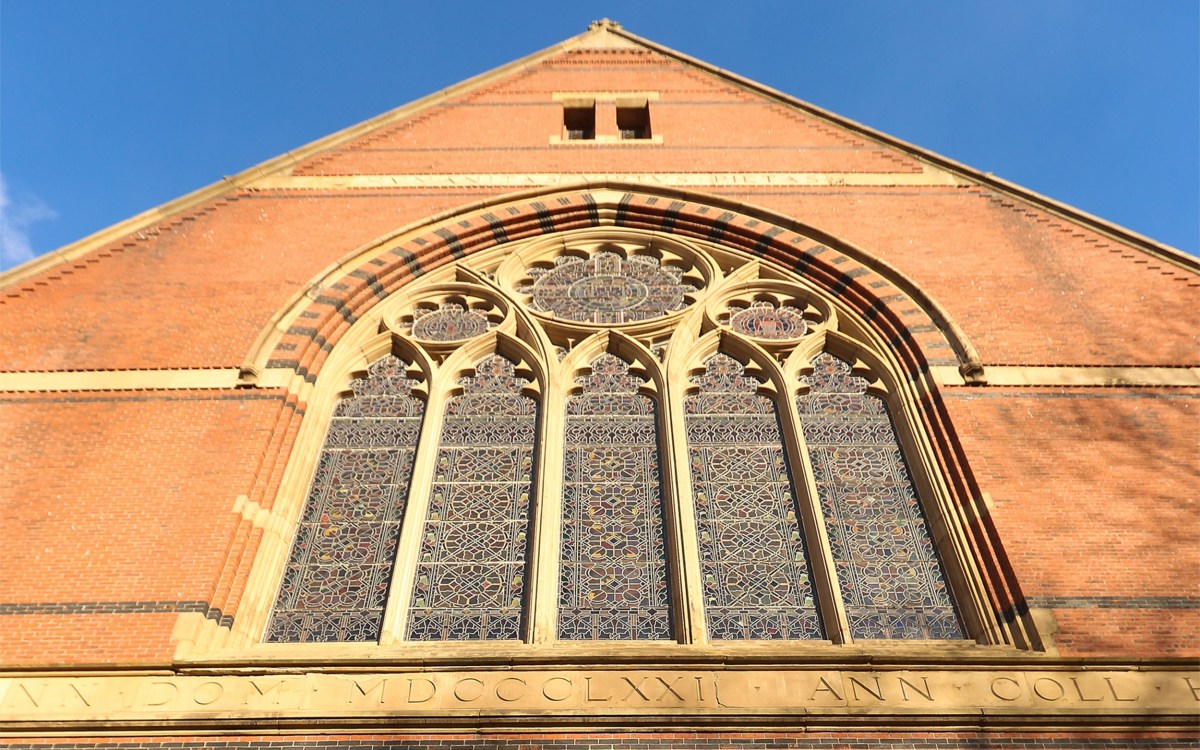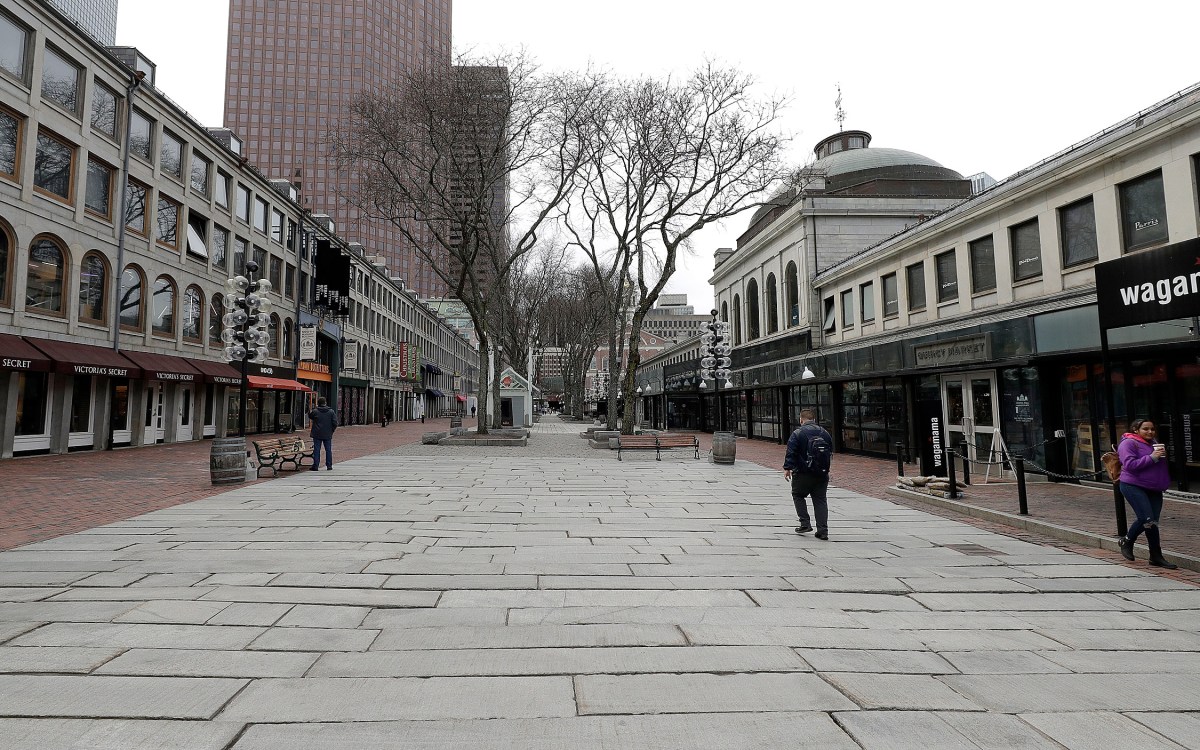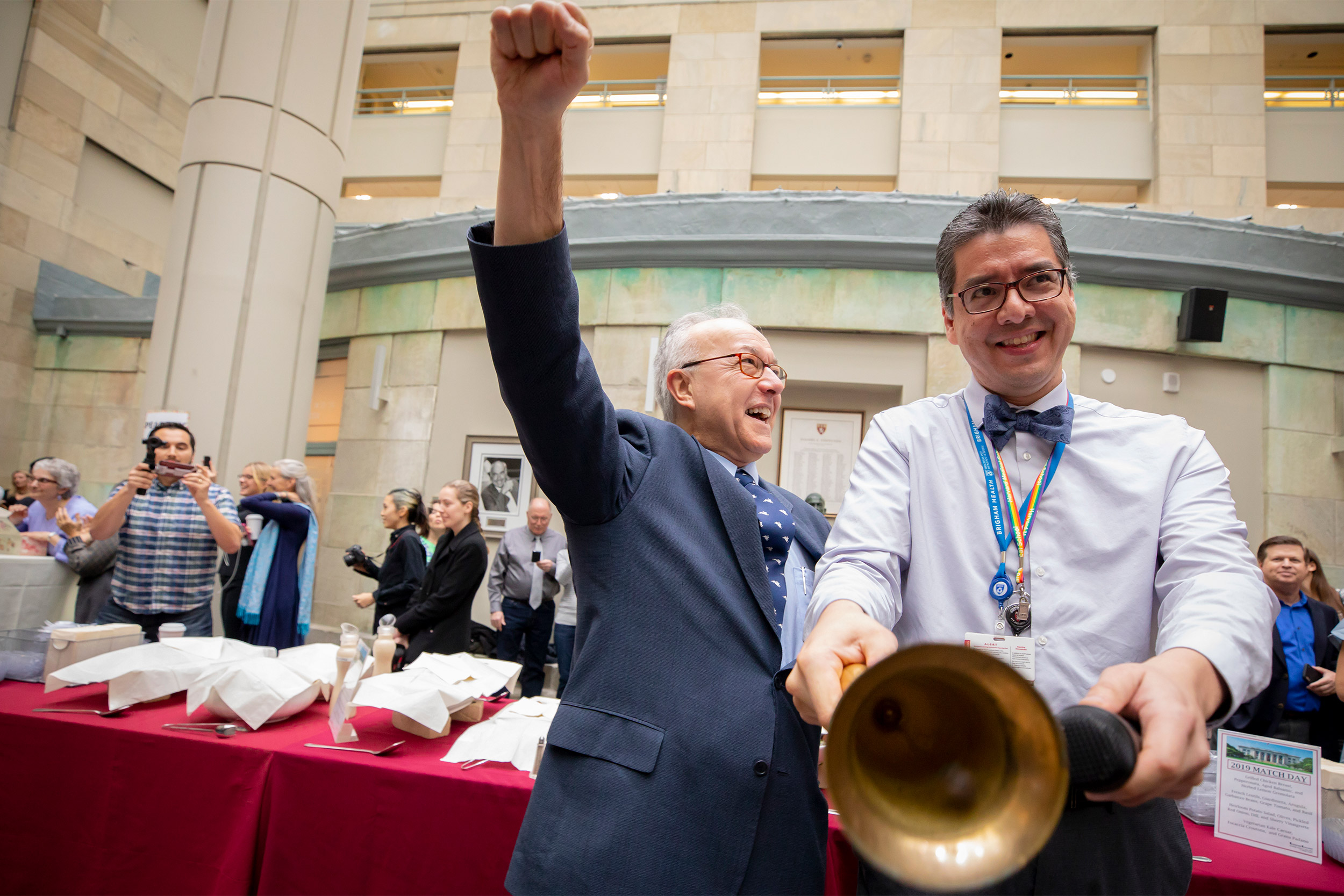
Last year on Match Day, Harvard Medical School’s Dean for Students Fidencio Saldaña (right) rang the traditional bell with Dean George Daly by his side. This year, social media accounts were set up so students could share in the celebration. And yes, the bell was rung via livestream.
Rose Lincoln/Harvard file photo
At graduate Schools, reinvention on the fly
Staff, faculty, and students have to adapt to meet demands of coronavirus pandemic
As everywhere else, Harvard’s graduate and professional Schools have had to adjust quickly to the new realities brought on by the rising coronavirus pandemic, halting normal operations, shifting to remote learning, and creating systems that serve their own unique needs and teaching missions.
Supplementing the University’s dedicated COVID-19 information website, the dozen Schools have created special sections on their own sites to communicate regularly with students, faculty, and staff about the latest announcements from deans and other senior administrators, provide links to the rapidly changing public health news and safety guidelines, and offering detailed information about the resources and forms of assistance available to members of the Harvard community.
Some Schools, such as the Harvard T.H. Chan School of Public Health, Harvard Graduate School of Education, and Harvard Business School, are drawing on their expertise to gather COVID-19-focused faculty research and advice on their areas of health, K-12 education, and business to satisfy a voracious, fact-starved public. Other Schools are grappling with ways to continue critical services that aren’t so easily shuffled online. Here are some of the key shifts underway.
Clinical training impacts
Delivering vital medical and legal services to those who need them and providing students with essential, hands-on training are important, enriching aspects of the professional education at Harvard Medical School (HMS), Harvard School of Dental Medicine (HDSM), and Harvard Law School (HLS).
But as School leaders grapple with federal, state, and local guidelines covering how best to protect students, faculty, and staff in high-risk settings or where close contact with others is unavoidable, clinical work for HMS and HDSM students has been temporarily halted or radically scaled back.
Clinical rotations at Harvard’s teaching hospitals — including Massachusetts General Hospital, Brigham and Women’s Hospital, Beth Israel Deaconess Medical Center, Boston Children’s Hospital, and Cambridge Health Alliance — were paused through Sunday, and may be delayed longer. The move is temporary, an HMS spokeswoman stressed, but will be long enough “to give the hospitals and the clinical faculty administrators time to devise a plan for the students where they can continue to train but won’t be involved dealing with COVID patients.”
On March 16, the Dental School halted all clinical services except dental emergencies for existing patients “until further notice,” said German Gallucci, Raymond J. and Elva Pomfret Nagle Associate Professor of Restorative Dentistry and Biomaterials Sciences and executive director of the Harvard Dental Center. The number of faculty, staff, and students handling emergency services has been cut back, with very few students assigned to the ER. The hiatus has dramatically reduced the clinic caseload, which had been logging 45,000 visits a year but has gone from seeing 200 patients a day down to just five for urgent care.
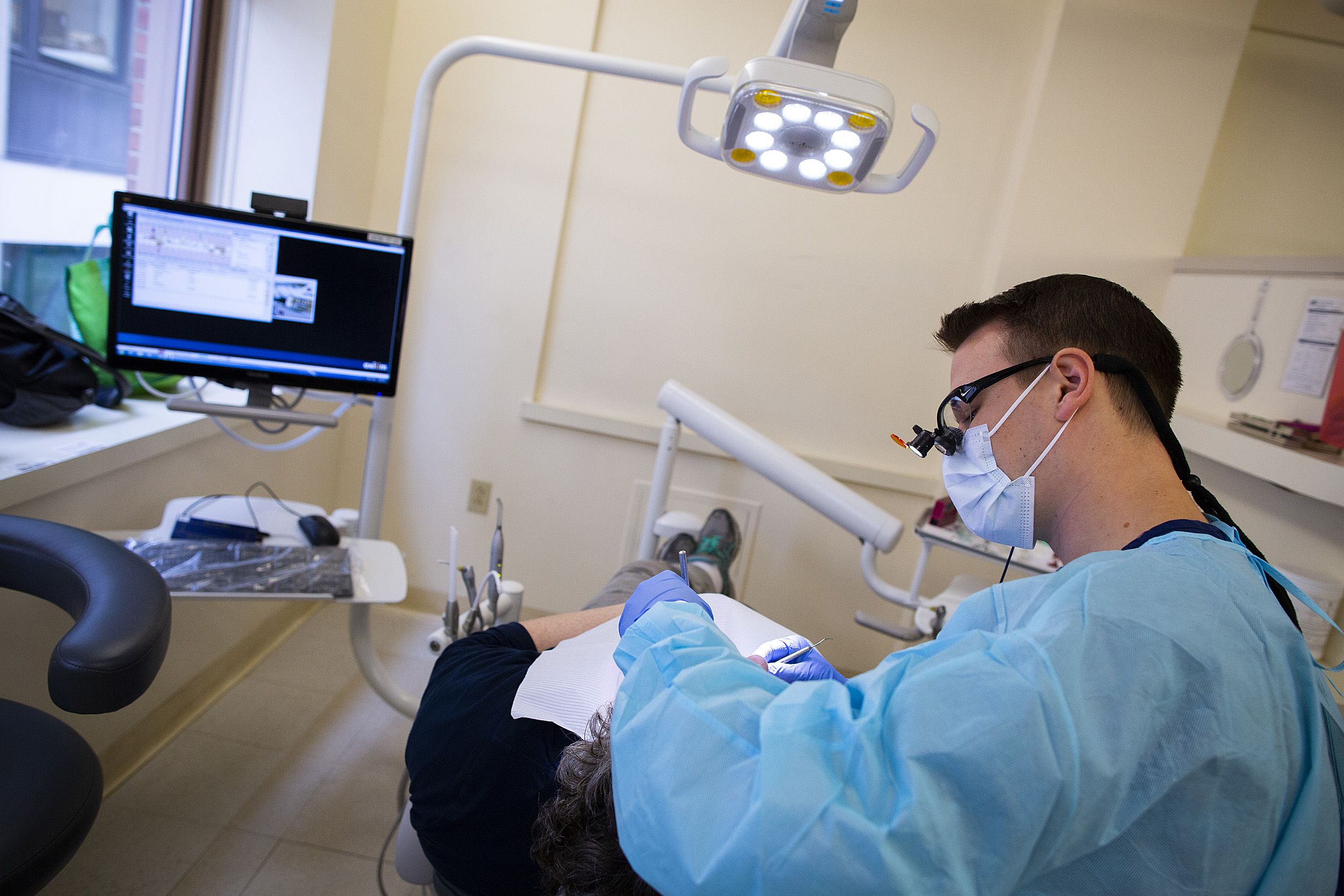
Dental School student Tom Ferlito (right) treats a patient. Regular appointments are currently suspended.
Stephanie Mitchell/Harvard file photo
The scale-back will protect students, faculty and staff from exposure, while keeping emergency dental treatment going to ease the expected strain on hospitals and the health system in the coming weeks.
Gallucci said that, given the pandemic’s many unknowns, he concurred with his colleague Jennifer Gibbs, director of the Division of Endodontics, who predicted, “This could be our new normal for an extended period of time.” Even when the spread of the coronavirus is under control, she said, people in dental medicine “will have to learn how to practice with this disease among us.”
At the Law School, meanwhile, 44 clinics and student practice organizations continue to serve clients and work on cases, said Lisa Dealy, assistant dean for clinical and pro bono programs. The state trial courts have barred all in-person hearings and will take only emergency cases during the outbreak.
Let’s keep in touch — no, really
In normal times, students at the Graduate School of Arts and Sciences (GSAS) don’t have much chance to meet up what with research, teaching, studying and family obligations. So the GSAS Student Center, formerly known as Dudley House, has served as a vital social hub, hosting parties, offering arts and cultural programming, and sponsoring outdoor, athletic, and other activities to get students out of their academic bubbles and interact with students from other disciplines.
After the University shift to digital learning, the 25 Ph.D. student fellows who host interactive events moved quickly to ensure that social distancing wouldn’t erode the grad students’ sense of community. Using Engage, a social engagement platform also used by the College, center fellows have begun ramping up a slate of options to gather virtually, including a weekly knitting and crochet circle, a photography workshop, and virtual exercise classes.
“I was just so impressed that even though all of their lives were sort of cast into chaos in terms of moving and heading home and … maybe moving to new residence halls, they still were really committed to building community and finding ways to continue to connect GSAS students,” said Jacqueline Yun, executive director of the center.
Sarah Kozel and Etha Williams, third- and sixth-year doctoral students studying historical musicology in the Music Department, decided to launch a podcast, “Distant Socialing,” after the campus closure put an end to a tongue-in-cheek “conceptual podcast” they had held over meals in the Commons dining hall, where they would discuss and rate the food and chat with whomever joined them.
GSAS Student Center team is committed to keeping in touch — and keeping their sense of humor.
Photo courtesy of GSAS Engage
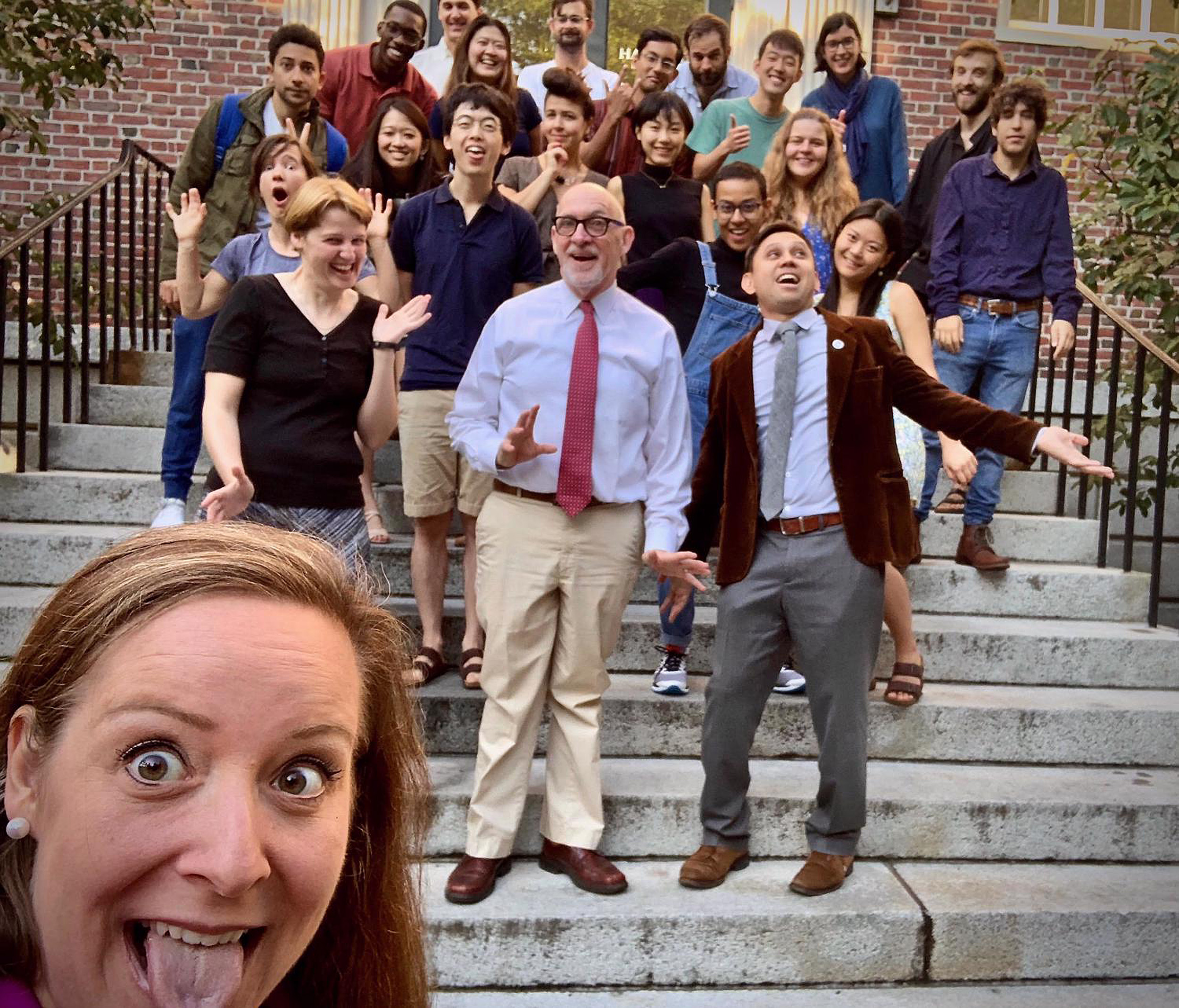
“When the coronavirus crisis hit, we started trying to think about ways to maintain closeness and community amidst growing physical distance — both small-scale (social distancing and campus closures in Cambridge) and large-scale (as Sarah returned to Canada while I stayed in Cambridge),” Williams said via email. “We thought that making our conceptual podcast a ‘real’ podcast could be one way to do this.”
In addition to their usual humor, the pair discuss the psychological aspects of coping with the pandemic and share some tips they learned in a Harvard University Health Services workshop, “Managing Emotions.”
“I just love this because it’s so good for mental health and well-being,” Yun said of the fellows’ latest effort. “It’s hard enough to be a Ph.D. student; it is so incredibly isolating and our population has a tendency to isolate because the work that they’re doing is asking the big questions in lonely libraries. So I’m just so grateful that our students are trending forward trying to say, ‘We need to stay connected to each other during this time.’”
Students vs. Pandemics
With so many feeling overwhelmed by the abrupt changes and confused by the rapid pace of information coming at them from so many disparate sources about the COVID-19 pandemic or where to find help for difficulties, graduate students Gwendolyn Lee, M.D./M.P.P. ’20, and her sister, Alexandria “Allie” Lee, M.S. ’20, thought students could use a central repository to find and share the most accurate, useful information and more easily communicate with each other. Ideally, they hoped this would empower students to take action to begin solving the many challenges of the current public health crisis.
On March 13, the student-run group Students vs. Pandemics created a Google Sheet with sections on how to stay healthy, where to find resources, ideas for having fun or bringing about systemic change, and complain + fix, where problems are identified, and then go about trying to fix them. Students are encouraged to add ideas and share information on the spreadsheet. So far, more than 30 students have contributed, and they’re hoping to recruit others. Ideas include starting a COVID-19 hackathon for students to identify digital solutions, drafting policy memos to send to the Massachusetts Legislature, and helping other universities launch similar task forces.
More like this
“We talked with many friends and classmates who felt like so many changes were happening to us and that others were making significant decisions affecting our lives. That often happens in times of crisis, and we wanted to empower more students to respond and act. Students are very good at identifying needs and gaps, and we wanted to give them a platform to connect with others to innovate solutions,” said Gwendolyn Lee, who’s studying health policy at Harvard Kennedy School while also pursuing a medical degree at UCLA. Allie Lee is earning a master’s degree in epidemiology at the Harvard Chan School of Public Health.
Even as the group confronts the immediate COVID-19 crisis, Gwendolyn Lee said it’s also building institutional knowledge so that it’s better prepared for future disease outbreaks, epidemics and pandemics.
“More fundamentally, we would like to work toward building a model of prevention,” she said. “Students vs. Pandemics hopes to advocate for and help achieve preventive behavior so we won’t find ourselves in a situation like the one we face today.”
Coming together
In times of struggle, many take comfort and refuge in religious and spiritual gatherings. With that currently out of the question, some religious groups at Harvard Divinity School (HDS) are considering alternatives. The HDS Disciples and United Church of Christ Worship have begun shifting the weekly worship services and prayer times online, connecting everyone via Zoom. The first online service begins today.
Early last week, HDS students began contributing inspirational posts to the Office of the Chaplain and Religious and Spiritual Life’s Facebook page and Instagram accounts. So far, the posts have drawn on a variety of texts, from the Bible to Harry Potter.
Design for living apart
Harvard’s move to online teaching and learning presents challenges for disciplines where the work is almost entirely physical and doesn’t easily translate to 2D formats such as video — at least not without sacrificing essential components of the work.
At Harvard Graduate School of Design (GSD), Dean Sarah Whiting and the faculty have been taking advantage of the popular Zoom platform’s draw-over and annotation tools, particularly for “crits,” the one-on-one sessions in which a professor reviews and critiques individual student work, said GSD spokesman Travis Dagenais. Rather than hanging project renderings on the usual pin-up boards, they’re turning unused laptops into digital pinboards so professors can review the work on one screen while conducting the crit on another.
“I was just so impressed that even though all of their lives were sort of cast into chaos … they still were really committed to building community and finding ways to continue to connect GSAS students.”
Jacqueline Yun, executive director, GSAS Student Center
The School is still determining how faculty juries will conduct final reviews, which typically involve models, large drawings, and other physical elements, without being able to see these components in real life.
For those already tired of looking at home-office backdrops on Zoom, or who just want things to go back to “normal” even for a few minutes, a cheeky pair of Master’s in Design Studies students have created an assortment of colorful Zoom backgrounds from spaces in and around Gund Hall. The backgrounds have become a minor hit with students and even a dean or two.
One unexpected positive is that prior to the campus closure, GSD offered only one online course, the popular “The Architectural Imagination” on edX. Now, suddenly there are dozens of GSD courses going online, adapted and produced in short order and being tweaked in an ongoing manner. It’s been a tall order. “That contrast in number and scope illustrates our challenge as designers: Design pedagogy is uniquely difficult to conduct in a purely digital format, and this shift has been nothing shy of fundamental for us,” said Dagenais.
Festivities from afar
For fourth-year students at Harvard Medical School (HMS), the third Friday in March is a date they have dreamed about and worked toward for many years. On Match Day, the National Resident Matching Program notifies graduating seniors at medical schools across the country where they will serve their clinical residencies. At Harvard, the milestone usually takes place in the atrium of the Tosteson Medical Education Center at HMS, with students and their loved ones gathered, waiting for the dean of students’ traditional bell ringing at noon that kicks off the envelope-tearing, excited squeals, and hugs. This year, the matches will arrive via email, and Dean Fidencio Saldaña’s bell will be livestreamed to the approximately 165 seniors. The School has set up a social media account so students can share their celebrations, but from a safe distance.



